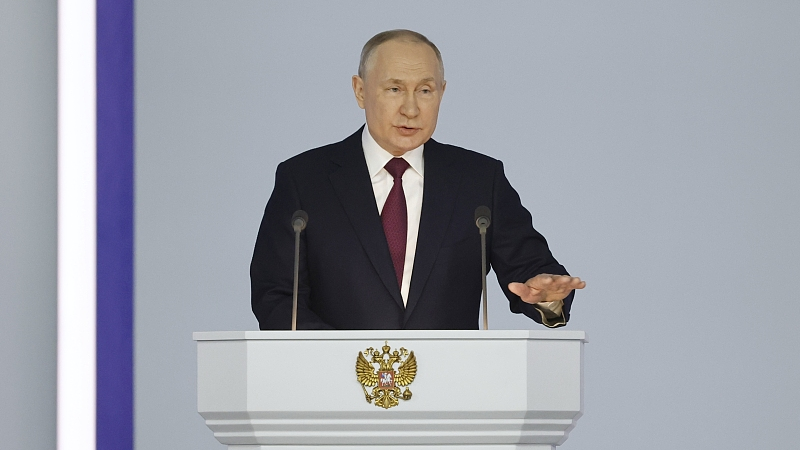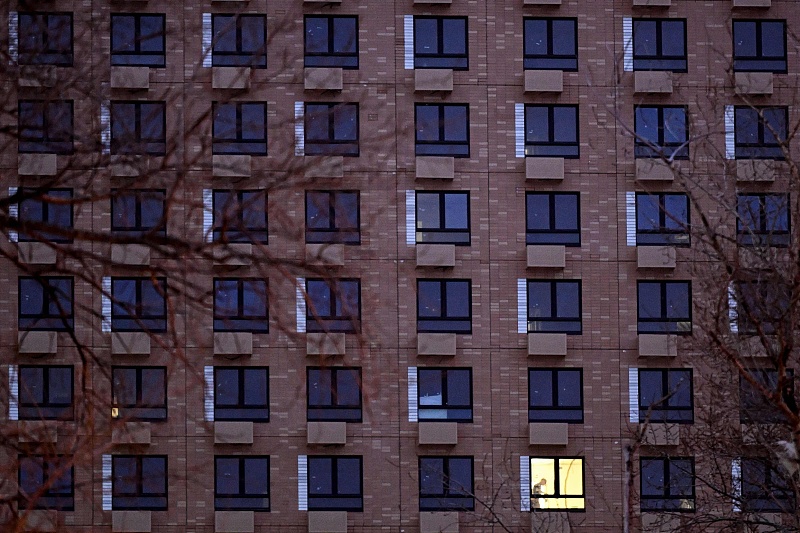
Russian President Vladimir Putin delivers his annual address to the Federal Assembly in Moscow, Russia, February 21, 2023. /CFP
Russian President Vladimir Putin delivers his annual address to the Federal Assembly in Moscow, Russia, February 21, 2023. /CFP
Editor's note: Andrew Korybko is a Moscow-based American political analyst. The article reflects the author's views and not necessarily those of CGTN.
Russian President Vladimir Putin delivered his annual address this year on February 21, during which time he spent about two hours reviewing a gamut of issues relevant to his country. These included those connected to its ongoing military campaign in Ukraine, which Moscow considers to be a special operation in defense of its national security red lines but which Kyiv and its Western partners condemn as an unprovoked invasion, as well as economic development and strategic security and other issues.
What follows is a list of the top seven takeaways from his speech.
The West provoked all phases of the Ukrainian conflict
The Russian leader traced the origin of the Ukrainian conflict to what he described as the Western-backed fascist coup in Kyiv in 2014, which subsequently sparked a civil war in the Donbas region. The Minsk accords weren't respected by anyone other than Moscow, he said, and were exploited as cover for arming Kyiv ahead of a final offensive for conquering that region. Russia urgently acted to preempt that scenario to save lives, ergo the specific timing of its ongoing military campaign.
The West uses Ukraine to wage hybrid war on Russia
President Putin accused NATO of clandestinely expanding into Ukraine, setting up illegal biological laboratories there, and training neo-Nazi militants and other terrorists as anti-Russian proxies. The goal, he explained, is to wipe his country off the map after forcing its strategic surrender. These hybrid threats prompted Russia to defend itself in line with international legal principles, President Putin said, and he pledged that his country will stay the course until its ultimate victory.
Full-spectrum socio-economic development is prioritized
On the home front, the Russian leader pledged to invest in all aspects of his country's economy, with a special focus being paid to small- and medium-sized enterprises as well as infrastructure. Families, students and veterans will also benefit from tax breaks and new government programs, including housing and training ones. Those former Ukrainian regions that voted to join Russia in September, which Kyiv and its Western partners regard as illegally annexed, will reap these benefits as well.
Russia will continue its global economic integration
Not to be deterred by the West's sanctions that failed to crash Russia's economy as President Putin proved through the multitude of facts that he cited to that end, Moscow will continue its global economic integration by focusing on Asian-directed logistical corridors to China, India, Iran and other countries. These are reliable partners, he said, unlike the West. Meanwhile, Russia will keep investing in its domestic market and production capabilities as part of its balanced growth strategy.

An apartment building under construction in a Moscow suburb, February 10, 2023. /CFP
An apartment building under construction in a Moscow suburb, February 10, 2023. /CFP
Big businesses are encouraged to repatriate their wealth
President Putin devoted considerable time to explain why those big business and their representatives who funneled their wealth outside Russia over the past three decades should repatriate it from the West after the latter provided unreliable and even outright stole some of their assets. He suggested that reinvesting it in their homeland will earn everyone's gratitude, help their country enhance its competitiveness, and be much safer than keeping it abroad during these turbulent times.
Russia will temporarily suspend participation in the New START
With NATO helping Ukraine launch drone strikes against Russia's strategic aviation and declaring its goal of Russia's strategic defeat, President Putin said that it makes no sense to allow the U.S. to inspect his country's strategic sites. He also warned that Russia will test new nuclear weapons if the U.S. does so first like his side's intelligence services informed him that it might soon do. Accordingly, President Putin temporarily suspended Russia's participation in the New START treaty.
The West is destabilizing the world for hegemonic reasons
The post-World War II world order has changed much in the three-quarters of a century since the UN's founding, but instead of responsibly accommodating the rise of new centers of development and influence, the West is destabilizing the world in a desperate bid to delay its hegemonic decline. Unilaterally revising the outcome of World War II, plotting foreign wars, and imposing lopsided ultimatums onto others are the West's means to this end, which Russia resolutely opposes.
In light of the abovementioned takeaways, the following can be concluded about his speech.
President Putin believes that everything Russia has done over the past year is in defense of its objective interests, so nobody should expect its military campaign in Ukraine to stop soon. His country's economy will continue reforming amidst the newfound conditions in which it was placed by the West's sanctions that failed to catalyze its collapse and accelerated its non-Western diversification. Looking forward, Russian-Western relations will likely remain tense, thus leading to further instability.
(If you want to contribute and have specific expertise, please contact us at opinions@cgtn.com. Follow @thouse_opinions on Twitter to discover the latest commentaries in the CGTN Opinion Section.)